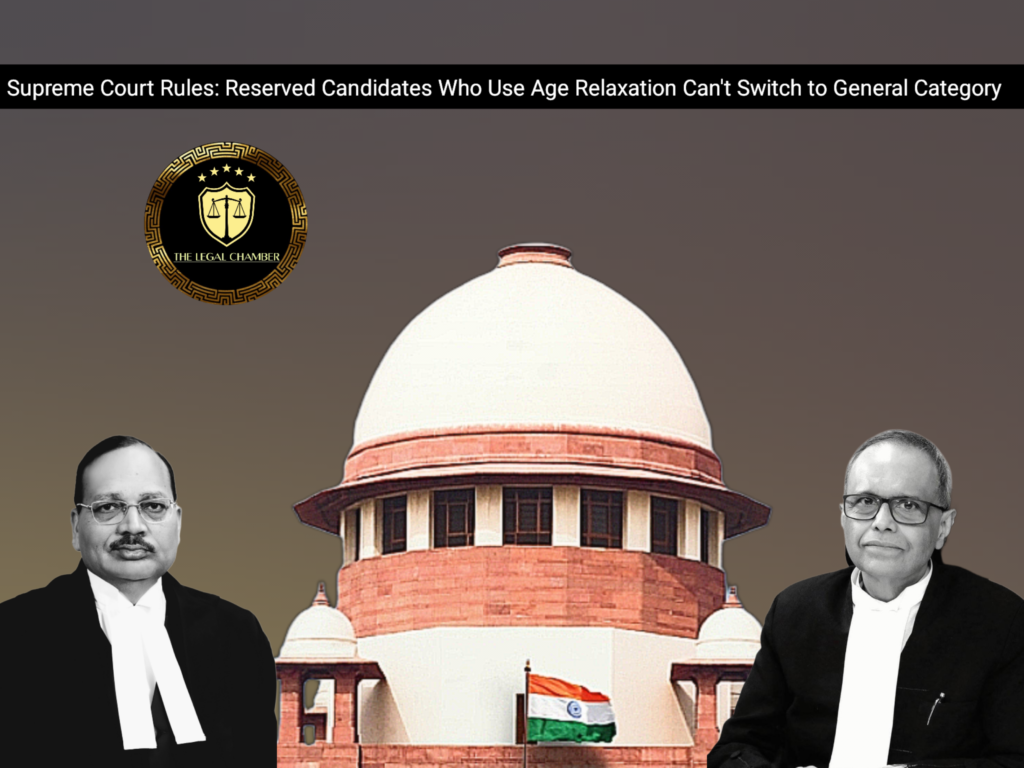
The Supreme Court held that reserved category candidates who avail age relaxation are barred from migrating to unreserved vacancies if the governing recruitment rules expressly prohibit it. The Court distinguished earlier precedents, ruling that such an embargo does not violate equality, as the right to be considered for general category posts depends on the specific rules of the recruitment process in question.
Facts Of The Case:
The case originated from a recruitment drive for Constable (GD) in various Central Armed Police Forces. The employment notification prescribed an age limit of 18-23 years, with a 3-year relaxation for OBC candidates. The respondents, OBC candidates, availed this age relaxation to participate in the selection process. However, they were not selected in the OBC category as their marks were lower than the last selected OBC candidate. Crucially, their scores were higher than the last selected candidate in the unreserved (general) category. They approached the High Court, arguing they should be appointed against unreserved vacancies based on merit. The Union of India opposed this, citing an Office Memorandum dated 01.07.1998, which stated that SC/ST/OBC candidates who avail relaxations (like in age limit) are to be counted against reserved vacancies and are deemed unavailable for unreserved posts. The High Court, relying on the precedent of Jitendra Kumar Singh v. State of UP, allowed the migration, holding that age relaxation is merely an “aid to reservation” and does not impair the level-playing field in the written examination. The Union of India then appealed to the Supreme Court against this judgment.
Procedural History:
The procedural journey began when the respondent-writ petitioners, unsuccessful OBC candidates, filed writ petitions before the High Court challenging their non-selection. The High Court, in its common judgment dated 12.10.2018, allowed the petitions, directing that the candidates be considered for appointment under the unreserved category. The appellants, the Union of India, then filed review petitions before the High Court, placing on record the crucial Office Memorandum dated 01.07.1998. However, the High Court dismissed these review petitions vide order dated 26.02.2019. Subsequently, the Union of India filed Special Leave Petitions (SLPs) before the Supreme Court, challenging both the original and review orders of the High Court. The Supreme Court granted leave and, after hearing the appeals, set aside the impugned judgments of the High Court, ultimately allowing the appeals filed by the Union of India.
READ ALSO:Supreme Court Overturns Conviction, Says Heated Neighbourhood Disputes Don’t Always Amount to Abetment of Suicide
Court Observation:
Final Decision & Judgement:
The Supreme Court allowed the appeals filed by the Union of India and set aside the impugned judgments and orders of the High Court. The Court held that in the teeth of the specific embargo contained in the Office Memorandum dated 01.07.1998, the respondents-writ petitioners, having availed the concession of age relaxation for the OBC category, were not entitled to be considered for appointment against unreserved vacancies. The Court concluded that the High Court was wrong in applying the ratio of Jitendra Kumar Singh and permitting such migration, thereby upholding the primacy of the specific recruitment rules governing the selection process.
Case Details:
Case Title: Union of India & Ors. vs. Sajib Roy Citation: 2025 INSC 1084 Appeal Number: (arising out of SLP (C) Nos. 21392-21393/2019) Date of Judgement: September 09, 2025 Judges/Justice Name: Justice Surya Kant and Justice Joymalya Bagchi
Download The Judgement Here